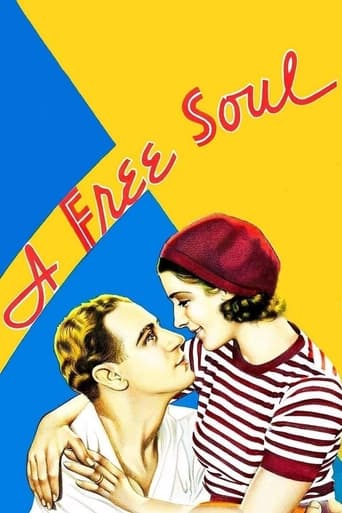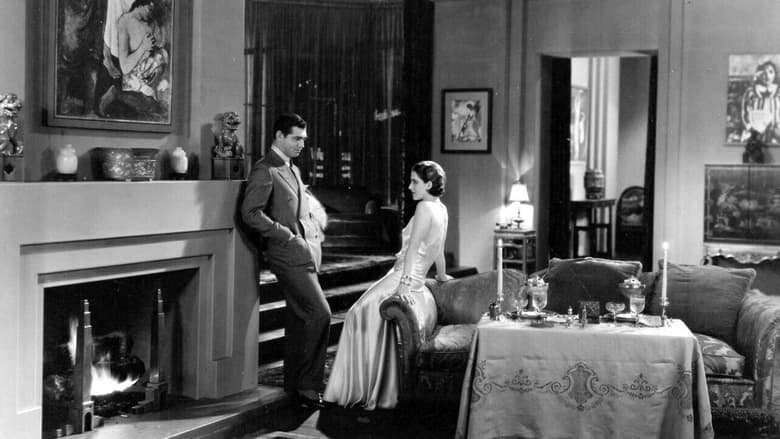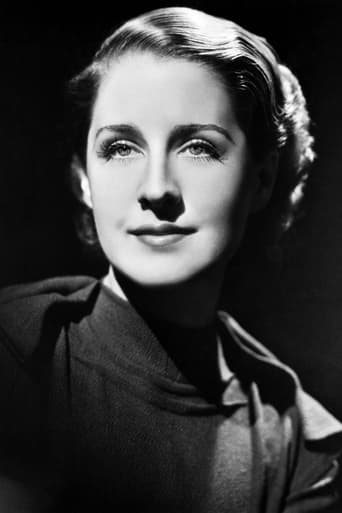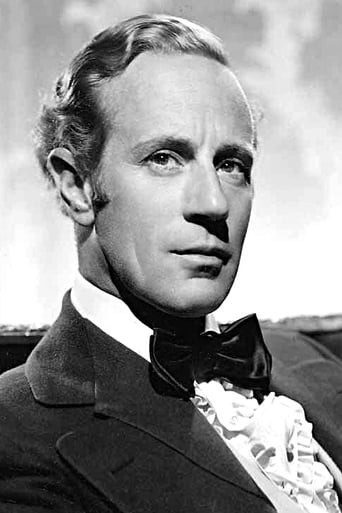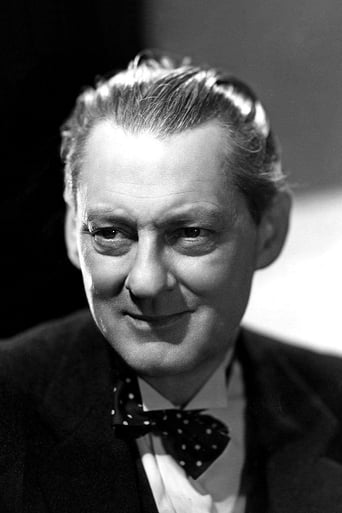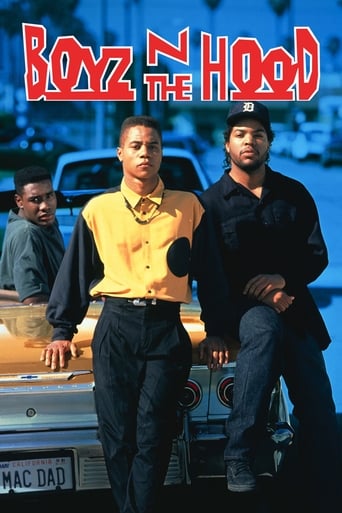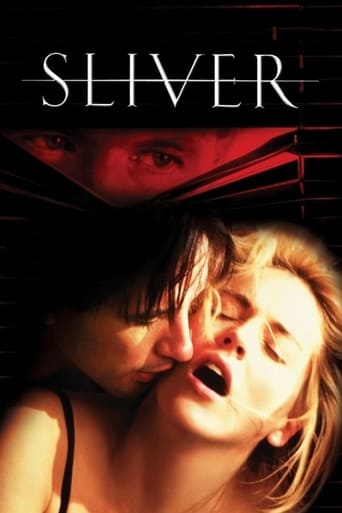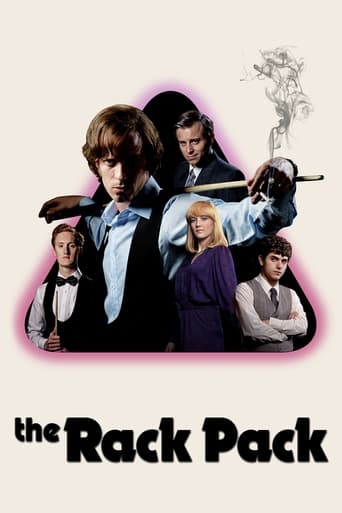A Free Soul (1931)
An alcoholic lawyer who successfully defended a notorious gambler on a murder charge objects when his free-spirited daughter becomes romantically involved with him.
Watch Trailer
Cast


Similar titles
Reviews
Too many fans seem to be blown away
This movie is the proof that the world is becoming a sick and dumb place
Good start, but then it gets ruined
Admirable film.
Norma Shearer made the transition to talkies easily: She had a well- placed voice and, when the role called for it, a natural way of handling dialogue. Unfortunately, A Free Soul doesn't call for much in the way of "natural" for Shearer, and it's one of the films that suggest why, of the major female stars of the 1930s (Garbo, Crawford, Loy, Harlow, Stanwyck, Dietrich, Hepburn, Colbert), she is the least remembered. She works hard at her role as the free- spirited daughter of an alcoholic defense attorney (Lionel Barrymore), but too often her work is undone by a tendency, perhaps carried over from silent films, to strike mannered poses: typically, hands on hips, shoulders back, chin high. She looks great in the barely-there gowns designed for her by Adrian, however. They seem to be held in place by will power (or double-sided tape). The plot calls on her to try to dry out her drunken father by wagering that if he can sober up, she'll give up her relationship with the sexy gangster her father managed to save from a murder rap. That gangster is played by Clark Gable, who got fifth billing (after James Gleason!), a sign of his status at the time. Gable had been making movies, usually in bit parts, since 1923, but this was the film that catapulted him, at age 30, into stardom. He still stands out in the movie as a natural, unaffected presence amid the mannered Shearer, hammy Barrymore, and pasty-looking Leslie Howard. It doesn't even hurt Gable that he's cast as a heel named Ace Wilfong, which brings to mind the insurance salesman in It's a Gift (Norman Z. McLeod, 1934) who annoys W.C. Fields with his search for Carl LaFong, "Capital L, small a, capital F, small o, small n, small g. LaFong. Carl LaFong." The improbable story comes from a novel by Adela Rogers St. Johns that had been adapted into a play by Willard Mack. (Incidentally, the play had been directed on Broadway in 1928 by George Cukor and starred Melvyn Douglas as Ace Wilfong.) Barrymore won the best actor Oscar on the strength of the courtroom speech he gives at the film's end. Barrymore claimed that he did it in one take with the help of multiple cameras, but the logistics of lighting for that many cameras makes his story hard to credit. (charlesmatthews.blogspot.com)
For decades I thought of this film as the one in which Clark Gable famously slaps Norma Shearer, inaugurating an era in rough loving that made women swoon at his brutality. I had read about this in numerous movie-history books and had even read that the studio was inundated with letters from women who wanted Gable to slap them. Well, nothing of the sort. Gable gently shoves Shearer onto a sofa, but that's it. The only slap is the one Shearer gives her father (Lionel Barrymore) when he is about to call her a tramp but before he can say the word. Somehow the slap, during the decades when the film went unseen, got transferred to Gable hitting Shearer. Don't believe everything you read!Another discovery on watching it was that much of the film is taken up not with the romance between the gangster and the Nob Hill lady but with Shearer's attempts to cure her father of alcoholism. Too much. Indeed, too much of these two altogether. Shearer, with her big nose and wonky eyes, was never a beauty, though she certainly carried on like one, with lots of arch, coy silent-movie mannerisms (head thrown back, back of hand covering face). Barrymore is, as usual, grade-B ham, getting sloppily sozzled and, when sober, full of maudlin pleas for sympathy.The legal aspect is laughable. The evidence that acquits Gable during the trial that begins the movie is so obviously absurd that this would have been discovered long before the trial began; also, it is not sufficient to be exculpatory on its own. In the trial at the end, legal procedure is violated or ignored, as anyone who has watched an episode of Law and Order--or perhaps even Perry Mason--can tell. The movie also wants to have the title both ways. Though we are frequently told that the Shearer character is over 21 (she looks older than her real age, 29) and has been brought up to be independent, we are also supposed to feel sorry for her because her father was weak and unable to protect her. Sorry, you can have only one verdict.Even so, the movie is well worth watching for occasionally snappy dialogue and its record of past manners and morals and for Adrian's fabulous, slinky gowns. Above all, for Gable, looking so beautiful, as he did in his other early movies, without the face fuzz. Amid all the phoniness, he is a real human being and a real man. Leslie Howard, too, is more interesting than the leads in his small and stereotypical part, making his character not merely a snobbish narrow-minded socialite but a man who is painfully and touchingly repressed. I presume the name of Gable's gangster--Ace Wilfong--is from the Adela Rogers St. John novel on which the film is based. If so, a pity that no one had the nerve to tell her this ludicrous combination of an aviator and a Chinese laundryman showed she wasn't so au fait with San Francisco low life as she thought.
An alcoholic lawyer's daughter falls for a gambler client, even as her upper-class beau wants to marry her.No wonder Gable's career took off with this film. He's got a presence that's riveting, exuding an animal magnetism that's no exaggeration. No wonder Shearer's winsome Jan Ashe falls for him on first meeting, and pity poor Leslie Howard, always a little short in the allure department, for having to compete. It's a good solid story, well acted, with even the scene- stealing Barrymore mostly under control. And, boy, do I like Shearer's clinging gown sans underwear. Move over Harlowe, and thank you pre-Code for the cheap thrill. Okay, maybe those exterior camping sets don't measure up to MGM's usual big-budget standard, but who cares since it's the story's momentum that carries us through. Then too, I hope there's a place in Hollywood heaven for fine unsung actors like James Gleason (Eddie). He's one of those Hollywood grunts who never gave a bad performance. It's those guys and gals who carry the industry on their collective backs.In my little book, there's one overriding scene. That's where snooty Dad (Barrymore) finds out criminal-class Ace (Gable) wants to marry his well-bred daughter. Offended, Dad calls Ace among other things a "mongrel" for his presumptuousness and lack of upper-class pedigree. It's a startling reversal of their formerly friendly relations, showing that some invisible class line has suddenly been crossed. As Dad, Barrymore really spits out the lines in impressive fashion, but you've got to wonder about his life expectancy from that point on since Ace is one powerful screen presence.Anyhow, the movie may be an antique, but it's certainly one worth collecting, thanks to a good story and fine ensemble acting.
At some point in a courtroom scene, someone says, "This is too theatrical." His comment fits a description of this Clarence Brown movie that features NORMA SHEARER, LESLIE HOWARD and LIONEL BARRYMORE in leading roles.But the actor who commands the most attention whenever he appears is CLARK GABLE, then being groomed for stardom by MGM. He was given another "dangerous guy" role as a gangster who had once been a client of Shearer's father (Barrymore) and set free. Complications ensue when Shearer falls in love with the man she treats as a "boy toy" and the melodrama gets steamier when Leslie Howard has to protect her by shooting Gable.Remade in the '50s for an Elizabeth Taylor film called "The Girl Who Had Everything," it's hampered by the '31 conventions of early talkies, all of them featuring performers who were still using silent film technique for their acting styles. Thus, you can expect a lot of overacting, especially from Lionel Barrymore who uses all of his mannerisms to the nth degree in the final courtroom confrontation. Yet, he won a Best Actor Oscar for his very theatrical performance.Summing up: It's a matter of taste--and whether or not you can tolerate all the talky dialogue played out in stage-like fashion by a cast of talented players trying to make the transition to sound films. Of the cast members, it's Clark Gable who actually gives the most natural performance in the film--and whom one can easily spot as a candidate for stardom.

